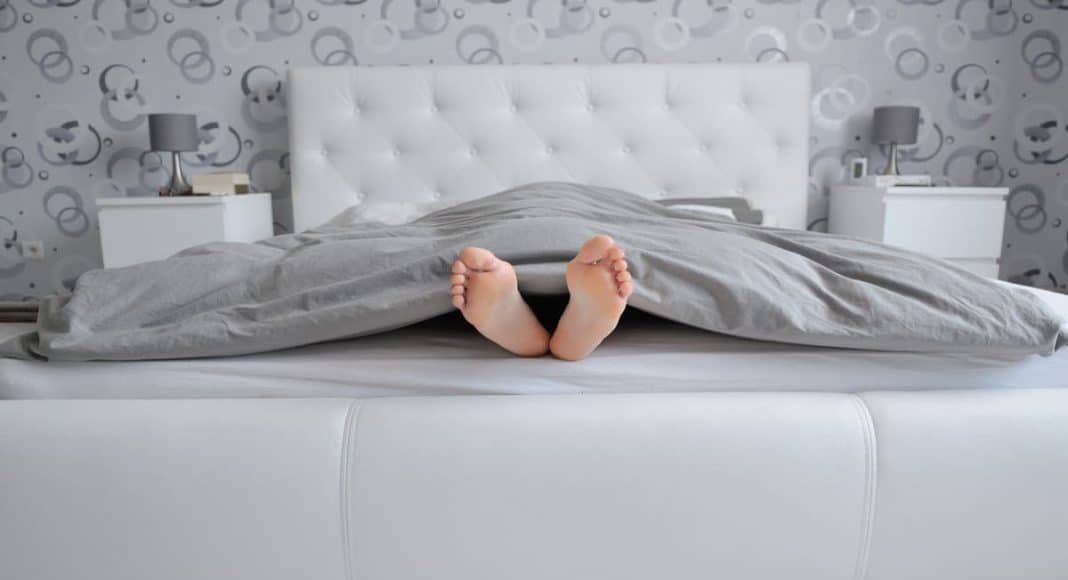Falling back on your pillow and covering up with a nice comforter is one of the things many people look forward to as the end of the day nears, and often times, as soon as the alarm goes off in the morning. So, if you’d like to keep thinking of your bed as your respite, stop reading. But if you want a glimpse into what’s really happening between the sheets— and not the fun stuff — read on.
1. You Should Probably Sleep Naked
As humans, we shed about 500 million skin cells and a liter of sweat every. single. day. And you know what loves skin cells and sweat? Bacteria and other organisms in your bed. According to an ABC News investigation, even brand new clothes with tags still attached can be contaminated with norovirus (sometimes lovingly known as the “winter vomiting bug”), staph germs, and at the very least, bacteria. So, yeah, don’t sit on your bed with unwashed clothes.
-
Related Story: How Using Marijuana Can Effect Your Sleep Patterns
And pajamas are no better. If not washed regularly, they could cause skin infections via the built up dead skin cells. A survey by mattress company Ergoflex found that on average, women wear their pajamas 17 nights in a row, creating the perfect storm of bacteria and microorganisms, including staph.
https://giphy.com/gifs/bug-14p3gzd3S53nJ6
2. It Might Be Healthier NOT to Make Your Bed
Scientists believe that an atmosphere of open air exposure versus warm and cozy darkness is more likely to keep the dust mites away. A study out of Kingston University found that bugs cannot survive in the warm, dry conditions found in an unmade bed.
-
Related Story: Is It Better To Shower During The Morning Or At Night?
“The average bed could be home to up to 1.5 million house dust mites,” reports the BBC. “The bugs, which are less than a millimetre long, feed on scales of human skin and produce allergens which are easily inhaled during sleep. The warm, damp conditions created in an occupied bed are ideal for the creatures, but they are less likely to thrive when moisture is in shorter supply.” So, that’s fun.
https://giphy.com/gifs/ghr-xHfkC4W19yNi0
3. Your Pillows Are Probably Garbage
A normal sized pillow will double in weight over a three-year period. Want to know why? (No, you don’t). It’s not because it’s taking midnight trips to the kitchen. It’s because it’s absorbing dust mites and dead skin cells. You’re welcome.
https://giphy.com/gifs/infomercial-frustration-pillows-zaJrlisx3WRc4
4. Your Bedding Should Stay Off The Floor
Don’t throw your bedding on the floor, like ever. In fact, consider your floor hot lava when you’re changing your sheets.
-
Related Story: 5 Ways To Catch An STD That Don’t Involve Having Sex
That’s because there are way more germs (about 4,000) crawling around in your carpet than on your toilet. We’re talking things like viruses, bacteria and allergens. Picking up a vacuum everyday wouldn’t hurt.
https://giphy.com/gifs/funny-yourself-f45VwDmiTEFPi
5. Your Dirty Sheets Can Cause Acne
According to Dermascope sheets that aren’t washed regularly can cause acne when your body’s natural oils and dirt are absorbed by the sheets, causing build-up over time. “Dirty sheets and dirty clothes can transfer dirt and bacteria into the hair follicle, causing it to clog and become infected. Women that use makeup on their neck are also more prone to chest acne. Makeup along with sweat can cause the pores to clog.”
https://giphy.com/gifs/summer-little-LGx0pr59Dx9QY


